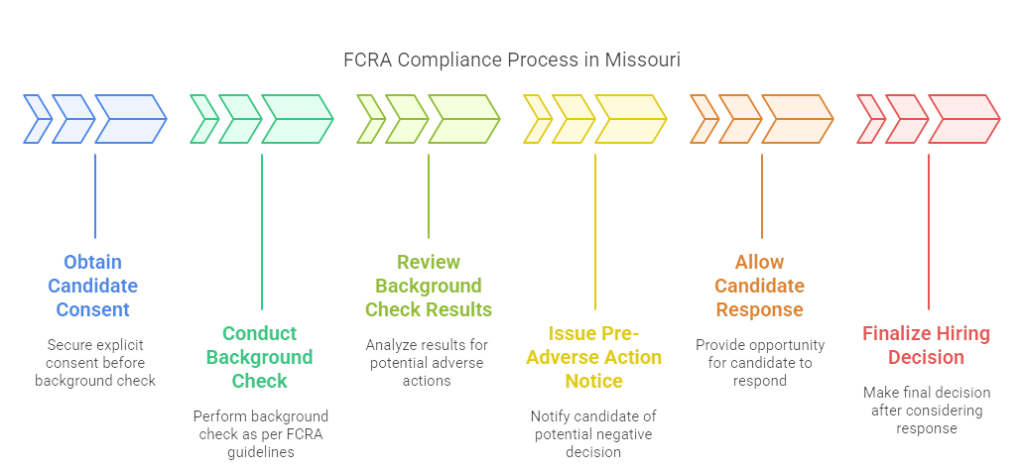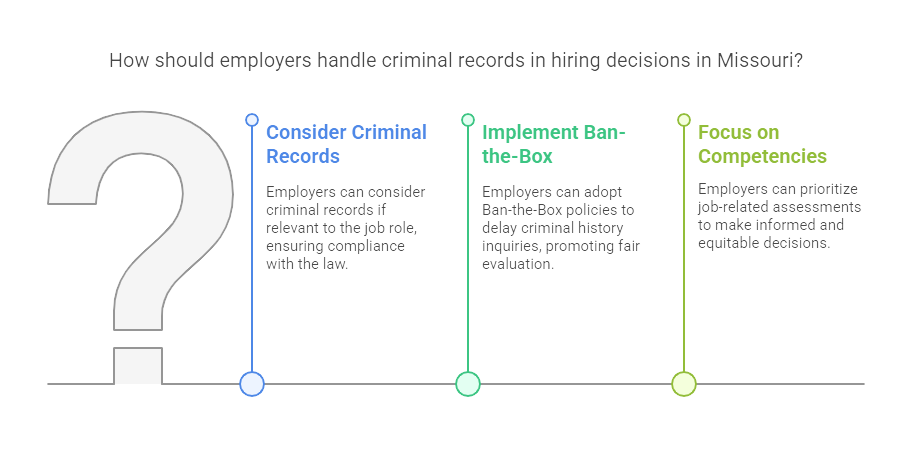Background checks are a critical component of the hiring process for many businesses. In Missouri, navigating the complex landscape of background check laws is essential for ensuring compliance and making informed hiring decisions. This guide provides a practical overview of Missouri background check laws, offering valuable insights for businesses looking to understand and apply these regulations effectively.
Key Takeaways
- Understanding Missouri background check laws is essential for businesses to ensure smooth and compliant hiring processes.
- Missouri background checks typically include criminal records, employment history, and education verification, requiring a balance between risk management and candidate privacy rights.
- Compliance with Missouri and federal laws, like the FCRA, necessitates transparent background check processes, including obtaining candidate consent and handling adverse actions properly.
- Missouri's local "Ban-the-Box" laws aim to provide fair employment opportunities by delaying inquiries into criminal history until later in the hiring process.
- Missouri employers can access resources from government sites and professional organizations to navigate background check compliance and enhance their hiring practices.
Introduction
Understanding Missouri background check laws is an essential tool for businesses, whether you're hiring your first employee or your hundredth. Navigating state and federal regulations is crucial for a smooth hiring process and avoiding legal issues. This guide aims to demystify these laws, offering practical insights tailored to Missouri's specifics.
Conducting thorough background checks reduces hiring risks and ensures legal compliance. Missouri, much like other states, has its set of rules that intersect with broader federal guidelines. This guide provides actionable knowledge for businesses striving to make fair and legally sound hiring decisions.
EXPERT INSIGHT: We don't just screen résumés in HR-we sift through life experience. Every background check that I've ever conducted has reminded me that diligence and dignity need not be mutually exclusive. Laws are written to be interpreted, and the task is in the execution: not to be gatekeepers, but guardians of fair play. I've seen the way that a balanced procedure that is fair in both compliance and compassion can re-energize a candidate's confidence rather than sap it away from them. Because we don't just hire bodies when we hire with heart and uphold the law with empathy, we earn trust - hire by hire. - Charm Paz, CHRP
Understanding Missouri Background Check Laws
In Missouri, a background check gathers information about a job applicant to assist employers in making informed hiring decisions. The typical components of these checks include criminal records, employment history, and education verification. Each part builds a complete view of the candidate, ensuring alignment with the company's standards and trustworthiness criteria.
Missouri businesses frequently engage in employment screening to minimize risks associated with new hires. In this state, the practice involves a nuanced assessment of the individual's experiences and history, rather than just checking boxes. Common practices include verifying past employment, checking educational qualifications, and conducting criminal history checks.
Missouri allows broad scope for conducting checks, but businesses must balance acquiring information with respecting privacy rights. Consequently, employers often partner with third-party agencies specializing in background screenings to ensure precision and compliance with the law. This approach aids businesses in maintaining a balance between due diligence and the rights of individuals seeking employment. Understanding the role and limits of background checks in Missouri is crucial for any company conducting these investigations legally and effectively.
Key Aspects of Missouri HR Compliance
In Missouri, understanding state-specific regulations is crucial for HR teams conducting background checks. Missouri law primarily focuses on ensuring fair hiring practices while protecting candidate privacy. Employers must not use arrest records without conviction in employment decisions, and they should verify the relevance and accuracy of any criminal information obtained.
On the federal level, the Fair Credit Reporting Act (FCRA) establishes the framework for background checks. Employers must clearly notify candidates about background checks, obtain written consent, and handle adverse actions appropriately. In Missouri, these federal guidelines intersect with state practices, building a comprehensive compliance structure.
For best HR compliance practices, transparency is essential. Employers should communicate openly with candidates about background check processes and ensure that all sensitive information is stored securely. Keeping abreast of both state-specific and federal laws allows Missouri businesses to streamline hiring processes while minimizing legal risks.
Ensuring Missouri FCRA Compliance
The Fair Credit Reporting Act (FCRA) plays a crucial role in guiding the proper handling of background checks within Missouri. Compliance with the FCRA is not merely a legal obligation but a critical operational necessity. Missouri businesses must understand the framework of these federal guidelines to maintain integrity in their hiring practices. The FCRA mandates actions to ensure candidates are treated with respect and informed adequately.
The first step in FCRA compliance involves securing explicit consent from candidates before conducting a background check. This requires businesses to provide a clear, standalone disclosure detailing the intent to obtain a consumer report. It's essential that this document doesn't get buried within applications or other employment paperwork. Obtaining signed written consent is a non-negotiable aspect and should be diligently recorded and stored.
Next, if a background check reveals findings that could influence a negative hiring decision—referred to as "adverse action"—employers must follow a specified procedure. Initially, the applicant should receive a pre-adverse action notice, which includes a copy of the consumer report and a summary of their rights under the FCRA. This affords the individual an opportunity to dispute or clarify any potentially incorrect or outdated information. Only after allowing a reasonable period for the individual to respond and, if required, a re-investigation should the adverse hiring decision be finalized and communicated.
By adhering to these steps, Missouri businesses can navigate the intricacies of FCRA compliance, safeguarding both their operations and the rights of potential employees. It's an exercise in balancing the necessity of informed hiring decisions with the legal and ethical commitment to candidate transparency.

Missouri Legal Requirements and Hiring Laws
In Missouri, the handling of criminal records in employment decisions is guided by a framework that seeks to balance workplace safety with fair hiring practices. Employers are allowed to consider criminal records, but they must ensure that any related decisions are made in compliance with the law. This involves assessing whether a candidate’s criminal history is directly relevant to the job role. The aim is to avoid blanket exclusions that could disproportionately affect certain groups of job seekers.
Missouri's "Ban-the-Box" laws represent a significant policy aimed at providing fair employment opportunities. While there is no statewide ban, several municipalities, including St. Louis and Kansas City, have adopted such ordinances. These laws restrict employers from asking about a candidate's criminal history until later in the hiring process, typically after the initial interview. This approach is intended to allow applicants to be evaluated first based on their qualifications rather than being prematurely disqualified due to their criminal record.
The impact of these laws on hiring practices is substantial. Employers must carefully structure their application processes to comply, often revisiting when and how they integrate criminal background inquiries. This has led many businesses to enhance their focus on job-related assessments and candidate competencies first. By doing so, companies can make more informed and equitable hiring decisions while still protecting their business interests.

Resources for Missouri Employers
Navigating the intricate world of background check laws can be daunting. Fortunately, Missouri employers have access to a variety of resources to help ensure compliance and facilitate informed decision-making.
Government and Legal Resources
Start by exploring authoritative websites such as the EEOC and the FTC. These sites provide essential guidelines on fair employment practices and consumer rights related to background checks, serving as a solid foundation for understanding the legal landscape.
Here is a table of related government websites that would be useful for Missouri business owners interested in background checks:
| Website Name | URL | Description |
|---|---|---|
| Department of Labor and Industrial Relations (Missouri) | https://labor.mo.gov | Offers resources on labor laws, employment regulations, and licensing impacting background checks. |
| Department of Public Safety (Missouri) | https://dps.mo.gov | Provides access to criminal history records, fingerprinting services, and background check information. |
| Missouri Courts (Case.net) | https://www.courts.mo.gov/casenet | Access to court records, legal information, and public records relevant to background checks. |
| Department of Corrections (Missouri) | https://doc.mo.gov | Information on criminal records, parolees, and public safety concerns. |
| Office of the Attorney General (Missouri) | https://ago.mo.gov | Offers guidance on legal matters, including consumer protection and employment law. |
| Department of Economic Development (Missouri) | https://ded.mo.gov | Provides resources for business development and compliance with state regulations. |
| Office of Administration - Information Technology Services Division (Missouri) | https://oa.mo.gov/itsd | Information on state IT policies, data privacy, and security for handling sensitive background check data. |
| Missouri State Archives | https://www.sos.mo.gov/archives | Access to public records, historical documents, and archives useful for in-depth background research. |
| Missouri General Assembly | https://www.house.mo.gov | Stay updated on laws and regulations passed by the state legislature that may affect background checks. |
| Department of Health and Senior Services (Missouri) | https://health.mo.gov | Information on health regulations, requirements for employee screenings, and background checks in healthcare settings. |
Professional Organizations
Engaging with professional organizations can be highly beneficial. The Professional Background Screening Association (PBSA) offers invaluable insights into industry standards and regulatory updates. Similarly, the Society for Human Resource Management (SHRM) provides resources and networking opportunities tailored to HR professionals, helping them stay current with Missouri's employment laws and best practices.
These resources are not just repositories of knowledge; they are tools for enhancing compliance and fostering a fair hiring environment. By utilizing these avenues, employers can better navigate the complexities of the hiring process while safeguarding their operations against potential legal pitfalls.
Frequently Asked Questions (FAQ)
Missouri employment has unique legal nuances and ethical responsibilities—especially with regard to background screening. This FAQ addresses some of the most common of those most frequently asked by employers and offers brief, actionable answers to help you navigate compliance and achieve fairness and integrity in all employment decisions that you make.
What types of background checks are commonly used by Missouri employers?
In Missouri, employers typically use several types of background checks to make informed hiring decisions. These include criminal history checks, which examine past legal issues; employment verifications to confirm job history; and education verifications to authenticate academic credentials. Some companies may also conduct credit checks, particularly for roles involving financial responsibilities. Drug screening and driving records are additional checks used, especially relevant for industries where safety is a primary concern.
How does Missouri balance employment rights with the need for safe hiring?
Missouri seeks to balance these interests through legislation that protects both employers and potential employees. The state's compliance with the Fair Credit Reporting Act (FCRA) sets a foundation for how background checks should be conducted, requiring transparency and consent in the process. Additionally, "Ban-the-Box" laws at the local level aim to give job applicants with criminal records a fair chance by delaying questions about criminal history until later in the hiring process.
How should businesses respond to the findings of a background check?
When background checks reveal potential concerns, it's essential for businesses to follow a fair and compliant process. If a decision might be influenced by the findings, the employer must provide a pre-adverse action notice, allowing the candidate to review the report and dispute any inaccuracies. After considering the candidate's feedback, if the decision stands, a final adverse action notice must be provided. Throughout, companies should ensure their actions are consistent with Missouri's legal requirements and federal guidelines to avoid discrimination claims or other legal issues.
In conclusion, Missouri's background check laws offer a framework that is both intricate and vital for businesses to grasp. At the core, these regulations aim to balance the dual imperatives of robust hiring practices and the protection of individual rights. From understanding state-specific mandates to aligning procedures with federal directives like the FCRA, the path to compliance can be complex but is ultimately navigable with care and attention.
For businesses, staying vigilant and informed is not just a legal obligation but a strategic advantage. By adhering to these laws, employers not only shield their operations from potential legal liabilities but also contribute to a fair and equitable employment landscape. Ensuring compliance through diligence and transparency secures your organization’s reputation and reliability in the hiring process.
To that end, businesses are encouraged to actively engage with legal experts and employ the wealth of resources available, such as government guidelines and professional organizations. In doing so, they can optimize their hiring processes while upholding the highest standards of ethical and lawful conduct.
Resources
- Missouri General Assembly. (n.d.). Chapter 610: Public Records. Retrieved from https://revisor.mo.gov/main/OneSection.aspx?section=610
- Missouri Department of Public Safety. (n.d.). Background Checks. Retrieved from https://dps.mo.gov/dir/programs/criminal-justice-information-systems/background-checks
- Equal Employment Opportunity Commission. (2012). Enforcement Guidance on the Consideration of Arrest and Conviction Records in Employment Decisions Under Title VII of the Civil Rights Act of 1964. Retrieved from https://www.eeoc.gov/laws/guidance/arrest_conviction.cfm
- National Conference of State Legislatures. (2022). State Laws on Employment Background Checks. Retrieved from https://www.ncsl.org/research/labor-and-employment/state-laws-on-employment-background-checks.aspx
- Federal Bureau of Investigation. (n.d.). Background Checks. Retrieved from https://www.fbi.gov/services/cjis/background-checks
Still have questions?
Get in touch with our team today for a personalized demo and discover how our tailored volume pricing and packages can drive results for your business!
How useful was this page?*
Note: your comments are anonymous. We use them to improve the website. Do not include any personal details.
Visit our FCRA Compliance Tool or leave a message here if you need a response.
From the blog Explore the GCheck Content Hub

Massachusetts Background Check Laws: 2026 Employer Compliance Guide
27 Jan, 2026 • 16 min read
Florida Background Check Requirements: 2026 Compliance Guide
26 Jan, 2026 • 18 min read
Pennsylvania Background Check Laws: What Employers Must Know in 2026
23 Jan, 2026 • 19 min readThe information provided in this article is for general informational and educational purposes only and should not be construed as legal advice or a substitute for consultation with qualified legal counsel. While we strive to ensure accuracy, employment screening laws and regulations—including but not limited to the Fair Credit Reporting Act (FCRA), Equal Employment Opportunity Commission (EEOC) guidelines, state and local ban-the-box laws, industry-specific requirements, and other applicable federal, state, and local statutes—are subject to frequent changes, varying interpretations, and jurisdiction-specific applications that may affect their implementation in your organization. Employers and screening decision-makers are solely responsible for ensuring their background check policies, procedures, and practices comply with all applicable laws and regulations relevant to their specific industry, location, and circumstances. We strongly recommend consulting with qualified employment law attorneys and compliance professionals before making hiring, tenant screening, or other decisions based on background check information.


